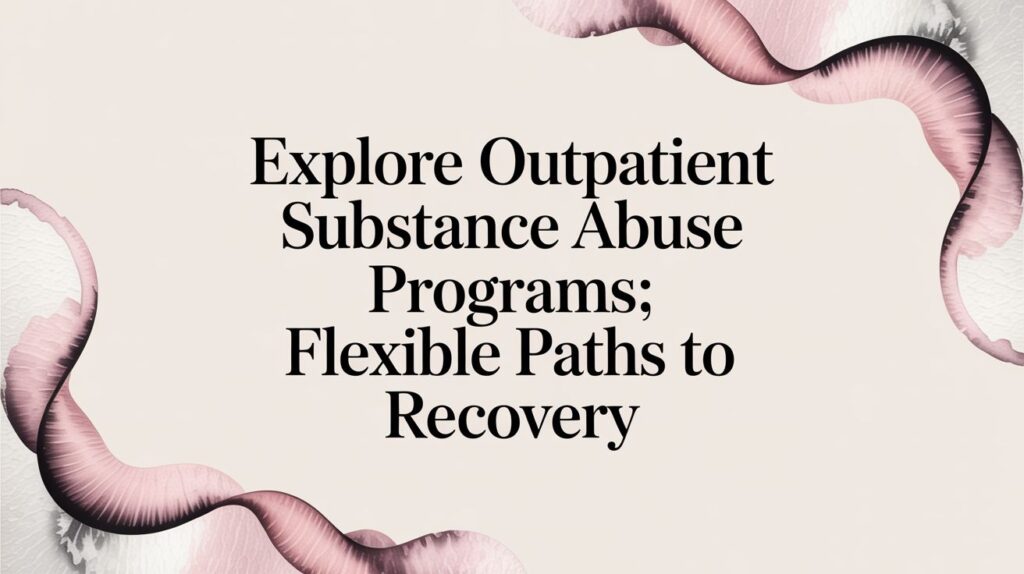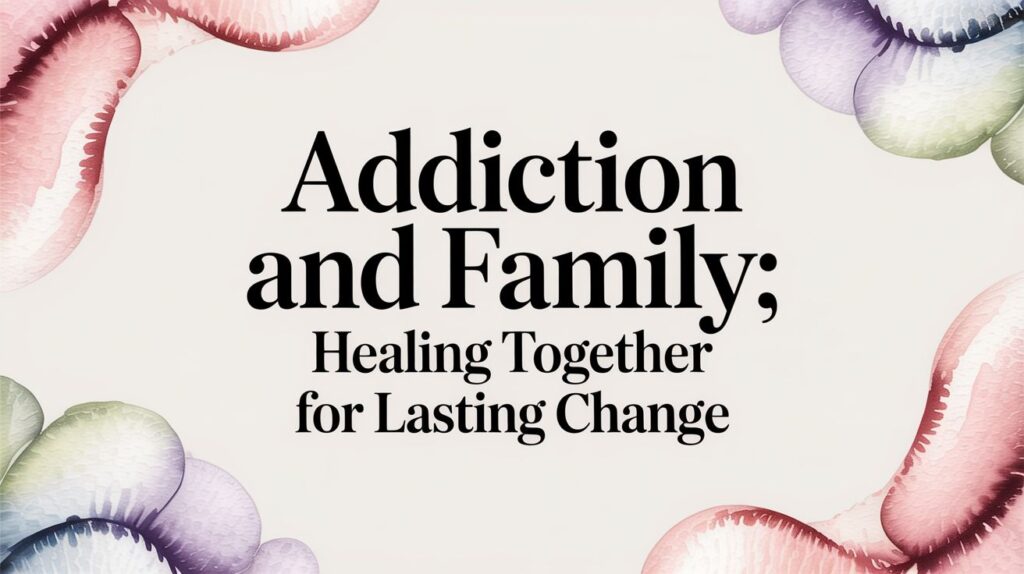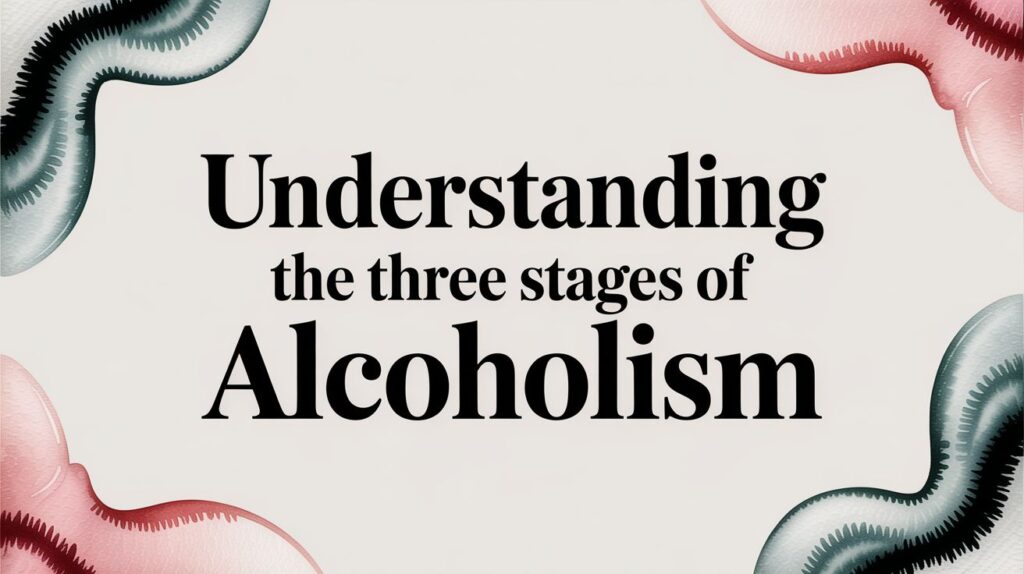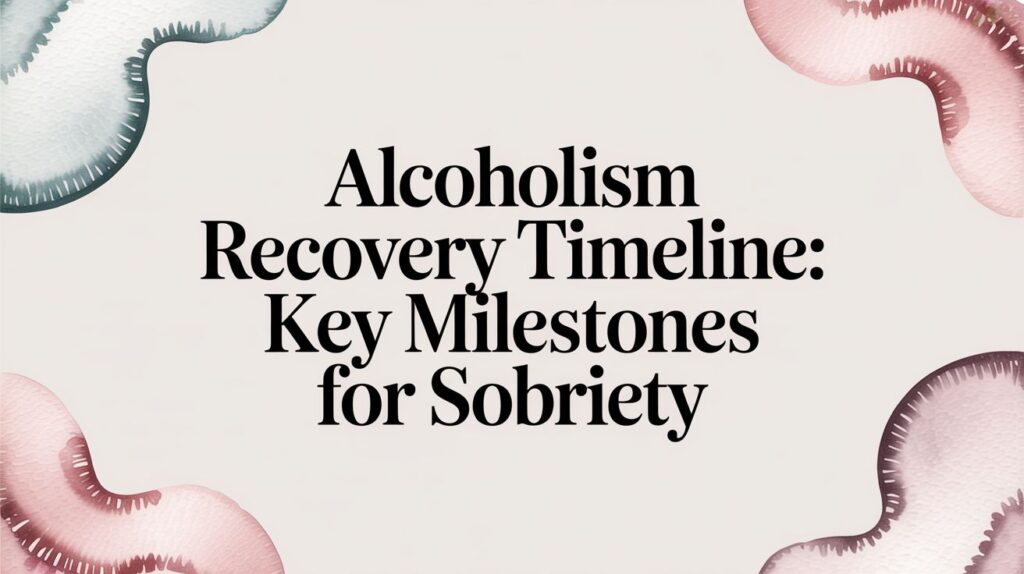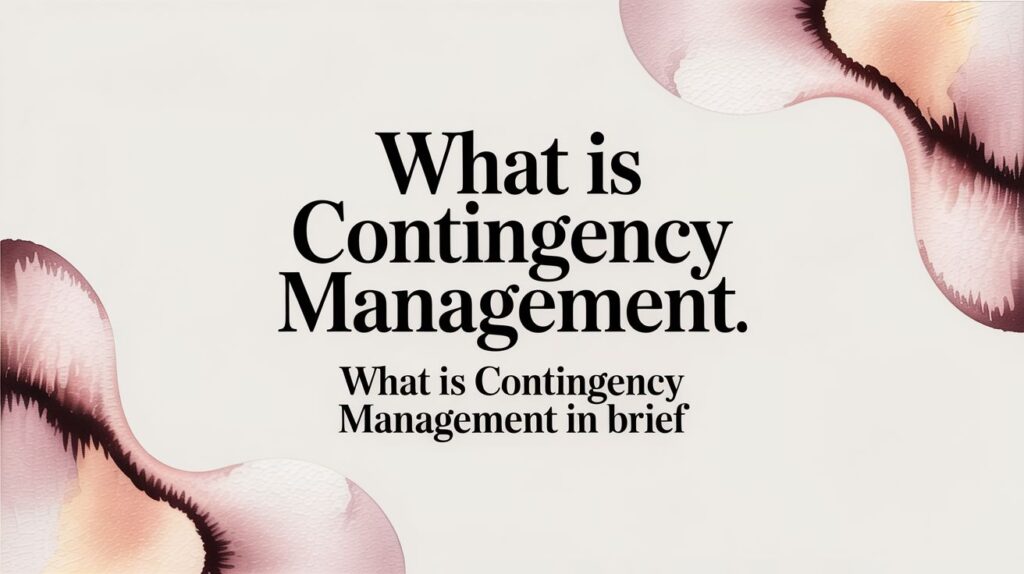When recovery begins, it’s like the quiet after a powerful storm. For a long time, the relationship has been battered by the chaos of addiction, and now that the storm has passed, the landscape is completely different. That initial silence can feel strange, a mix of relief and hope tangled up with resentment and a whole lot of uncertainty for both people involved.
This isn’t just about putting a stop to destructive habits. It's about looking at the wreckage and starting the hard work of clearing the debris to build something new. The very foundation that held the relationship together might be cracked or gone entirely, meaning you can't just patch things up—you have to create a whole new blueprint.
How Recovery Reshapes Your Relationship

The Shared Path of Healing
We often talk about addiction as one person's battle, but recovery is almost always a shared journey. The partner has been living in that storm, too, developing their own ways of coping—some healthy, some not—just to get through the day. As one person starts to heal, the entire relationship dynamic has to shift right along with them.
This shared healing means facing uncomfortable truths that were buried under the noise of active addiction. It’s a process that touches on a few key areas:
- Acknowledging Mutual Impact: The first step is recognizing that addiction hurt everyone, not just the person using. For partners who’ve felt overlooked, having their pain seen and validated is a game-changer.
- Navigating a New Normal: You have to learn how to relate to each other without a constant crisis in the background. Old roles, like the caretaker or the enabler, don’t fit anymore, and finding new ones can feel awkward.
- Building on a New Foundation: The relationship can't be defined by addiction anymore. It has to be rebuilt on something solid, like trust, open communication, and genuine mutual respect.
The goal isn’t to get back to the way things were before the storm. That old environment might have been part of the problem. The real goal is to build something stronger and more authentic on the cleared ground.
Empathy and Shared Responsibility
Making it through this new chapter of recovery and relationships comes down to empathy and a sense of shared responsibility. This doesn't mean the partner is to blame for the addiction—not at all. It means both people are now responsible for the health of the relationship moving forward. It’s a joint commitment to finding new ways to talk, listen, and support each other.
This journey demands incredible patience. For the person in recovery, it’s about proving their commitment through consistent, trustworthy actions over time. For their partner, it’s about learning to trust again, which is a slow, gradual process. Both have to be willing to heal their own wounds to create a partnership that doesn’t just survive, but truly thrives.
Understanding New Dynamics in Sobriety

When someone gets sober, the entire architecture of their relationships has to change. Before recovery, the partnership often revolved around the addiction, whether anyone admitted it or not. This created a strange, crisis-driven dynamic where the interactions, as chaotic and painful as they were, were at least predictable.
It was like a dance where both partners knew all the steps, no matter how destructive the moves. One person might have been the 'caretaker,' constantly trying to manage the chaos, while the other was at the center of it. Sobriety abruptly stops the music. It leaves both partners standing on the dance floor, completely unsure of how to move forward together.
The End of Crisis-Driven Roles
In active addiction, relationships often settle into specific, unhealthy roles. These roles provide a sense of purpose and structure, however flawed, and can become deeply ingrained identities that are surprisingly hard to let go of.
A few of these now-obsolete roles might sound familiar:
- The Enabler: This person unintentionally shields the individual from the consequences of their actions, usually out of love, fear, or a mix of both.
- The Caretaker: This role is all about managing daily life, making excuses, and cleaning up the messes addiction leaves behind, creating a powerful dynamic of dependency.
- The Hero: Often a child or partner, this person tries to bring some positivity to the family by overachieving, which distracts from the core problem.
- The Scapegoat: This person acts out and gets blamed for the family's problems, conveniently diverting attention away from the addiction itself.
When sobriety begins, these roles lose their function. The caretaker no longer has a crisis to manage. The enabler's help is no longer needed. This can trigger an identity crisis for both partners, leaving them feeling lost and unsure of their place in this new, sober relationship.
Without the constant storm of addiction to navigate, couples must learn to relate to each other in the calm. This shift requires moving from a reactive, crisis-management mode to one of intentional, proactive connection.
Navigating the Awkward Transition
This transition period is often marked by an uncomfortable quiet. The familiar arguments, anxieties, and routines that centered on substance use are just… gone. They're replaced by a void that can feel surprisingly empty. Couples have to learn how to communicate without the filter of addiction, which can feel like learning a whole new language.
Building healthier dynamics isn't always a smooth path, and many couples hit significant hurdles. It's a major stressor. We know that the crude divorce rate in the United States was 2.4 divorces per 1,000 people in 2022, with resilience often tied to factors like maturity and financial stability. Adding the stress of early recovery on top of that makes it clear why learning to navigate this period is so crucial for a relationship's survival.
Creating a New Relational Blueprint
To successfully navigate this new terrain, both partners must be willing to let go of the old blueprint and draw a new one together. This means consciously and deliberately replacing old, toxic patterns with healthier alternatives.
For example, a dynamic built on caretaking and dependency has to transform into one of mutual support and independence. The focus shifts from one person "saving" the other to both partners supporting each other's individual growth. This is a core part of what rehab aims to achieve—not just for the individual, but for their entire support system. For a deeper look, you might find our guide on what is rehab helpful.
Building this new foundation takes patience, empathy, and a shared commitment to a different kind of future. It’s about creating new rituals, celebrating sober milestones, and finding joy in shared experiences that have nothing to do with the past chaos. It's a deliberate and ongoing process of creating a partnership based on respect, honesty, and genuine connection.
Overcoming Common Roadblocks to Healing
The journey back to a healthy relationship after addiction is rarely a straight line. It's more like a winding country road—full of unexpected dips, tough climbs, and obstacles that can make you want to turn back. The first and most important step is to see these challenges not as signs of failure, but as normal, predictable parts of the healing process.
Every couple navigating recovery and relationships will hit their own unique set of bumps. That said, some roadblocks are so common you can almost anticipate them. These include the slow, often frustrating grind of rebuilding trust, dealing with the deep-seated resentments left over from the past, and figuring out how to be emotionally and physically close again in a new, sober world.
The Slow Grind of Rebuilding Trust
Trust is the bedrock of a partnership, and addiction acts like an earthquake, shattering that foundation completely. Putting it back together isn't a single grand gesture; it's a long, slow process built on hundreds of small, consistent actions over time. For the person in recovery, it means showing up with honesty and reliability, day in and day out. For their partner, it means finding the courage to gradually let go of the past hurts and take a leap of faith.
This process can feel agonizingly slow. You'll have good days filled with hope, followed by bad days where old fears creep back in. It’s a messy, non-linear journey where progress can feel invisible at first.
This image gives a sense of how trust can be gradually rebuilt with consistent effort and a real commitment from both people.
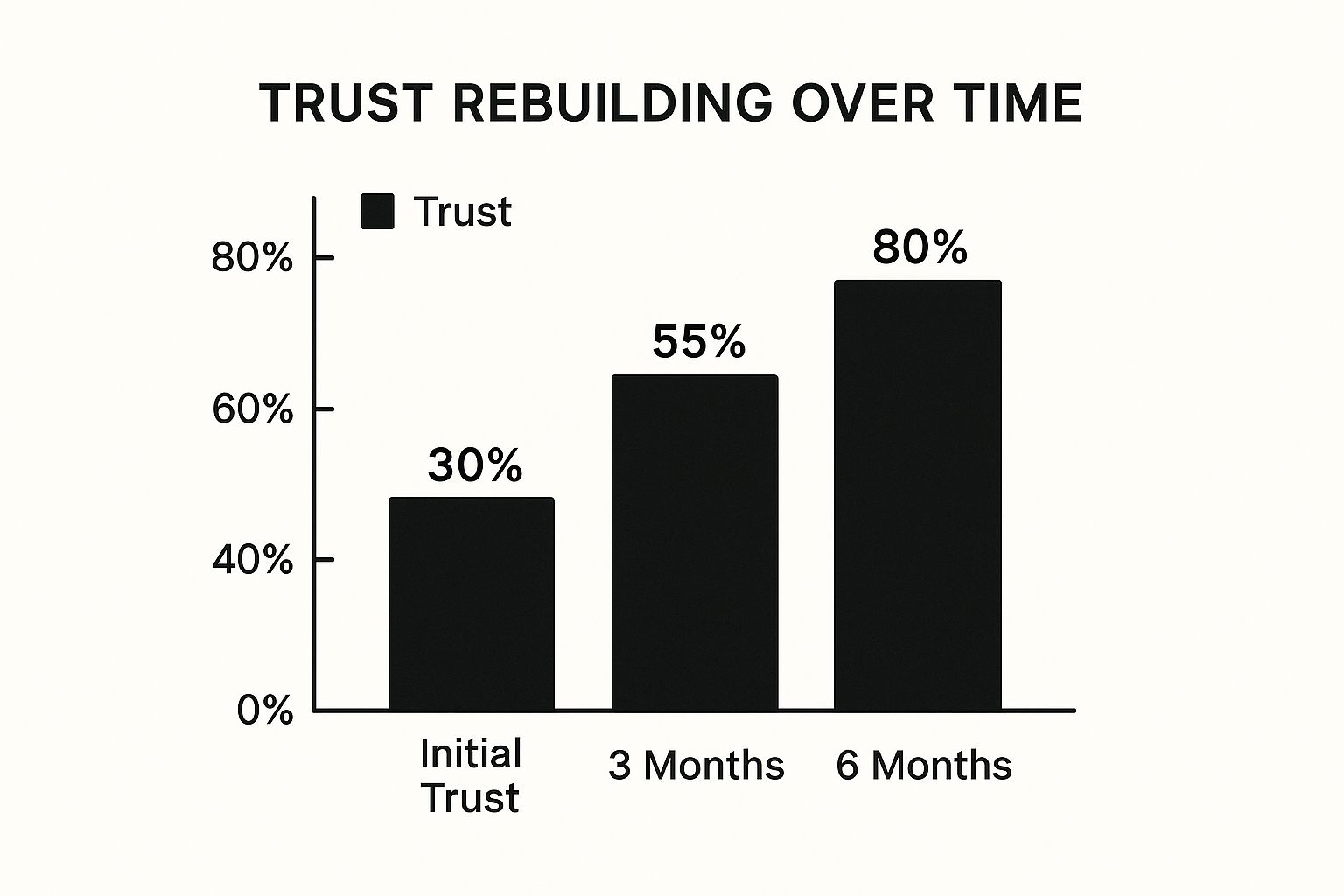
As the visual shows, even when you start from nearly zero, a steady pattern of positive actions over several months can lead to significant healing. It just takes a whole lot of patience.
Managing Lingering Resentments
While one person is working hard on their sobriety, their partner is often left holding a heavy bag of pain, betrayal, and anger from the past. These feelings don't just vanish when the substance use stops. They tend to stick around like embers, ready to flare up with the slightest provocation.
Resentment is the poison you drink hoping the other person will die. It damages the person holding onto it far more than anyone else. Letting it go is a crucial act of self-care for the partner, as much as it is for the relationship.
It's absolutely essential to acknowledge and validate this pain. Both partners need to create a safe space where these feelings can be discussed without blame or defensiveness. This is often where a good therapist or counselor becomes invaluable, offering neutral ground to unpack these heavy emotions constructively.
The Persistent Fear of Relapse
For a while, the fear of relapse can feel like a constant, unwelcome guest in the home. For the partner, every late text, sudden mood swing, or change in routine can trigger a wave of panic. Living in that state of hypervigilance is exhausting and makes it nearly impossible to relax into the new, sober dynamic.
This fear can lead to behaviors that look a lot like old, unhealthy patterns—like checking up on the partner or questioning their every move. While it's an understandable reaction, it can smother the very trust you're trying to rebuild. Learning to manage this fear involves:
- Focusing on Self-Care: The partner must prioritize their own well-being. This can mean finding support in groups like Al-Anon or through their own individual therapy.
- Trusting the Process: Both people have to put their faith in the recovery process and the new coping skills being learned.
- Open Communication: Creating a clear plan to talk about triggers and fears openly can lower the anxiety level for everyone.
The Communication and Intimacy Gap
Sobriety can sometimes create a new kind of distance. The person in recovery is often immersed in meetings, therapy, and intense self-reflection. They're basically learning a new emotional language, which can leave their partner feeling left behind or unable to connect with this new version of the person they love.
This gap often extends to physical and emotional intimacy. For years, substances may have been a crutch for connection. Now, the couple has to learn how to be close without them. It requires a raw vulnerability and a ton of patience to rediscover each other in this new light. This is a huge undertaking, and outside pressures don't help. The global landscape of divorce rates, for example, shows just how tough relationships can be. In some countries like Spain and Russia, over 70% of marriages end in divorce, while others see much lower rates. These figures underscore how critical strong communication and coping skills are for getting through any major stressor. You can explore more about these global relationship trends on soulmatcher.app.
Navigating Common Roadblocks in Recovery Relationships
To make these concepts a bit more concrete, this table breaks down some of the most frequent challenges couples face in recovery. Think of it as a quick-start guide to identifying a problem and taking that crucial first step.
| Challenge | Impact on Relationship | First Step to Address |
|---|---|---|
| Rebuilding Trust | Constant suspicion, anxiety, and a feeling of walking on eggshells for both partners. | The person in recovery must commit to radical honesty and consistent, verifiable actions. The partner must define one small, specific action that would represent a step toward trust. |
| Lingering Resentment | Old fights resurface, sarcasm and passive-aggression become common, and emotional intimacy feels impossible. | Acknowledge the partner's pain without defensiveness. Agree to discuss past hurts in a structured setting, like therapy, where both feel safe. |
| Fear of Relapse | The partner becomes hypervigilant, leading to controlling behaviors. The person in recovery feels smothered and untrusted. | Create a shared relapse prevention plan. The partner can focus on their own support system (like Al-Anon) to manage their anxiety. |
| Communication Gap | One partner feels emotionally distant or "in their own world," while the other feels left out and confused by the "recovery speak." | Schedule regular, non-recovery-focused time to connect. The person in recovery can practice sharing their feelings in simple, relatable terms. |
Each of these roadblocks requires a team effort to overcome. It's not about one person fixing the problem, but about both partners learning a new way to navigate the road together.
Getting past these hurdles demands a shared commitment. It means facing discomfort head-on, celebrating the small wins, and never losing sight of the healthier, more authentic relationship you're both working so hard to build.
A Toolkit for Rebuilding Trust and Connection

Knowing the challenges of recovery and relationships is one thing. Having the right tools to start mending what’s broken is another entirely. The hard truth is that rebuilding a partnership after addiction isn’t about grand, sweeping gestures. It’s about the small, consistent, and intentional actions you both take every single day.
It all comes down to learning a new way of being together. This means communicating differently, protecting your own well-being, and deliberately creating new, positive memories that can slowly overwrite the painful ones. Think of this section as a practical toolkit—the nuts and bolts of healing your connection from the ground up.
Mastering Healthier Communication
If a relationship has been impacted by addiction, chances are that blame, defensiveness, and dishonesty became the default settings. To move forward, you have to learn a new language, one built on vulnerability and respect. Two of the most powerful tools for this are ‘I’ statements and active listening.
Using 'I' statements is a game-changer. It shifts the focus from accusing your partner to simply expressing your own feelings. Instead of pointing a finger and saying, "You never listen to me," you could try, "I feel unheard when we talk about this." That small tweak can instantly disarm defensiveness and open the door to a real conversation.
Active listening is the other side of that coin. It’s about hearing to understand, not just waiting for your turn to talk. It involves:
- Giving your full, undivided attention—no phones, no distractions.
- Reflecting what you heard by saying something like, "It sounds like you're feeling overwhelmed."
- Asking clarifying questions to show you’re genuinely trying to get it.
This creates a safe space where both partners feel seen and validated. That feeling is the absolute bedrock of rebuilding emotional intimacy.
The Power of Healthy Boundaries
Boundaries are so often misunderstood. People think they’re walls meant to push others away, but in reality, they’re more like a fence with a gate. They protect your well-being while still allowing healthy connections to flourish. In relationships tangled with addiction, those fences were likely blurred, trampled, or nonexistent.
Setting them now is a radical act of self-care and mutual respect. It’s about clearly defining what you will and will not accept.
Boundaries aren't about controlling the other person's behavior; they're about taking responsibility for your own emotional and physical safety. They are the guidelines that teach others how to treat you with respect.
For example, a boundary might sound like this: "I will not have this conversation if you are raising your voice. I’m going to step away, and we can try again when we are both calm." Setting these limits is non-negotiable for your own healing journey. For a deeper dive, our article on setting boundaries in recovery offers more detailed strategies.
Creating New Shared Experiences
For a long time, the relationship’s energy was likely consumed by the chaos of addiction. To truly move forward, you have to intentionally create new, positive memories that have absolutely nothing to do with that past. It's about consciously replacing old, painful associations with fresh, joyful ones.
This doesn't have to be complicated or expensive. It can be as simple as:
- Starting a new hobby together, like hiking or cooking.
- Establishing a weekly "check-in" night just to talk about your relationship.
- Celebrating recovery milestones, no matter how small they seem.
These shared experiences become the new bricks and mortar of your partnership. They prove that your connection can be based on something positive and forward-looking, not just a shared history of pain.
Rebuilding a relationship requires a deep commitment, especially when societal pressures can be immense. Globally, divorce rates vary widely; for example, the Maldives has the highest rate at 5.52 per 1,000 people, while Slovenia’s is just 1 per 1,000. These numbers don't always reflect marital happiness, though, as social or legal barriers can keep people in unhealthy situations. This just underscores how important it is to build a truly resilient partnership. Each new positive memory you create together strengthens your foundation, making your relationship better equipped to handle whatever challenges come next.
When to Seek Professional Support
Trying to navigate the minefield of recovery and relationships all on your own can feel like trying to perform surgery on yourself. While personal commitment is the engine of recovery, some wounds are just too deep and the dynamics too tangled to heal without a skilled, neutral guide.
Recognizing when it’s time to bring in professional support isn’t a sign of failure. Far from it. It’s a strategic move that says you believe the relationship is worth fighting for.
Lots of couples wait until they’re at a breaking point, but the best time to get help is the moment you realize you’re stuck. If you're caught in the same cycle of blame, distrust, or emotional coldness and just can't find a way out, professional guidance can offer the fresh perspective and practical tools you need to move forward.
Understanding Family Systems Therapy
One of the most powerful approaches for couples in this situation is family systems therapy. It’s built on a simple but game-changing idea: addiction isn’t one person’s problem. It’s a condition that reshapes the entire family.
Think of a mobile hanging over a baby’s crib. If you nudge one of the little animals, the entire structure sways and rebalances in response. Nothing moves in isolation.
A family works the same way. Each person’s actions, moods, and choices send ripples through everyone else. Addiction forces the family system into an unhealthy state of balance, creating unspoken rules and roles just to cope with the chaos. When sobriety arrives, that old, dysfunctional balance is shattered, and the system needs help finding a new, healthier way to exist together.
Family systems therapy helps you stop asking, "Whose fault is this?" and start asking, "How do we, as a unit, heal from this?" It reframes the issue from an individual failing to a shared challenge that requires a team-based solution.
This shift is incredibly empowering. It lifts the heavy burden of blame off one person and puts the focus where it belongs: on building healthier ways of interacting for everyone involved.
What to Expect from Couples or Family Counseling
Walking into a therapist's office for the first time can feel intimidating, but it’s a safe, structured space designed for one purpose: healing. The goal is to give you both new skills to build a relationship that can thrive in a world without active addiction.
Here are a few things you’ll likely work on:
- Learning New Communication Patterns: The therapist acts as a coach, teaching you how to use tools like "I" statements and active listening. This helps you express your needs and actually hear each other without sliding back into those old, destructive arguments.
- Addressing Codependency and Unhealthy Roles: Counseling is the place to identify and dismantle the codependent dynamics that may have unknowingly enabled the addiction. This allows you both to build a new foundation based on mutual respect and healthy independence.
- Creating a Unified Front Against Relapse: Instead of one person being the "enforcer" and the other feeling watched, a therapist helps you create a practical relapse prevention plan together. You become a supportive team. Many of these strategies are tied to understanding past hurts, which is why it's so important to find a clinician who can guide you through that process. To learn more about specialized approaches, you can explore our article on what is trauma-informed therapy.
The Importance of Individual Support
While working on the relationship together is critical, it’s just as important for the partner of the person in recovery to get their own dedicated support. Their journey involves healing from their own pain, anxiety, and the trauma that addiction may have caused. This is where resources like Al-Anon become invaluable.
Al-Anon is a support group created for the friends and family of those with alcohol use disorder, but its principles are helpful for loved ones of anyone with an addiction. It provides a community of people who truly get it. It’s a space to focus on your own recovery, learn about setting healthy boundaries, and find a measure of peace, whether your loved one stays sober or not.
Ultimately, seeking professional support is one of the best investments you can make in your relationship's future. It provides a roadmap for healing, a toolkit for communication, and a neutral ground to start rebuilding the trust and connection you’ve lost.
Sustaining a Healthy Relationship Long Term
Getting to a place of stability in recovery feels like you’ve crossed a massive finish line, and in many ways, you have. But the real work of building a resilient relationship starts now. It isn’t about a final destination; it’s about learning how to run the marathon together, day after day.
Sustaining this new, healthier dynamic means treating the relationship like a living thing that needs constant care. The skills you both learned in the early, chaotic days of recovery—like clear communication, setting boundaries, and showing mutual respect—aren't just for crisis management. They have to become the daily habits that build a partnership strong enough to weather any storm that comes your way.
Keeping the Connection Resilient
Long-term success is built on proactive maintenance, not reactive repairs. This means creating rituals and habits that keep the lines of communication wide open and the foundation of trust solid. It’s all about intentionally nurturing the connection you worked so hard to rebuild.
A few key strategies can make all the difference:
- Schedule Regular Check-Ins: Set aside dedicated, phone-free time each week just to talk about the relationship itself. This isn't for discussing bills or who's taking out the trash; it's a safe space to share how you're both feeling about your connection.
- Celebrate Recovery Milestones: Make a big deal out of sobriety anniversaries and other recovery victories. Acknowledging these moments reinforces that you are a team and that their success is a shared joy.
- Continue Practicing Healthy Skills: Don't let those powerful communication tools get rusty. Keep using "I" statements and active listening, especially when things are calm, so they remain second nature during times of stress.
A post-recovery relationship can become stronger and more authentic than ever before. It's built on a foundation of honesty and resilience forged in the toughest of circumstances, but it requires continuous, conscious effort from both partners to maintain.
Navigating Life's Stressors Together
Life will inevitably throw curveballs—a job loss, a family illness, or a financial squeeze. The true test of a resilient recovery relationship is how you navigate these stressors without falling back into old, unhealthy dynamics. The temptation to slip back into caretaker or crisis-management roles can be incredibly strong.
Instead, these moments are your chance to lean on the new, healthier foundation you've built. This is where a strong set of individual coping skills becomes absolutely vital for both partners. To explore a range of effective techniques, our guide on coping skills for substance abuse offers practical strategies you can use.
The key is to face these challenges as a unified team. This means talking openly about fears and triggers, supporting each other's self-care routines, and remembering that you are no longer operating from a place of chaos. When you do this, you prove that the relationship isn't just surviving sobriety—it is truly thriving because of it.
Your Questions, Answered
When you're navigating the messy intersection of recovery and relationships, you're bound to have questions. These are the ones we hear most often from families trying to find their footing again. Let's tackle them head-on.
How Long Does It Take to Rebuild Trust?
There's no magic number here. Think of trust not as a light switch you can flip back on, but as something you rebuild one brick at a time, day after day. It’s a slow, steady process that hinges entirely on consistent, honest actions.
For the person in recovery, this means showing up—emotionally and physically—in all the small moments. It’s doing what you say you’ll do, without fanfare. For the partner, it means being willing to see those efforts and, slowly, letting the new reality replace the old fears. Professional counseling can be a huge help in guiding this delicate dance.
Can a Relationship Truly Survive Addiction?
Absolutely. It’s a tough road, no question, and addiction puts an incredible strain on a partnership. But many couples don’t just survive; they come out the other side with a stronger, more honest connection than they ever had before.
Success rides on one thing: a shared commitment from both people to do their own healing work while also tending to the relationship.
The real win is shifting the dynamic from one defined by crisis and chaos to one built on mutual respect, healthy boundaries, and real communication. It’s hard work, but the result is a partnership that’s truly authentic.
What Is the Partner's Role in Preventing Relapse?
Your role is to be a supportive partner, not the “sobriety police.” This is a crucial distinction. You can’t actually prevent someone else’s relapse; recovery is their personal responsibility, full stop. Your most important job is to hold your own healthy boundaries.
This looks like encouraging their involvement in a recovery program while also refusing to fall back into old, enabling patterns. The single most supportive thing you can do is focus on your own well-being, whether that’s through Al-Anon, your own therapy, or other support networks. When you’re healthy, you contribute to a healthy environment for everyone.
At Altura Recovery, we know just how tangled recovery and relationships can get. Our family systems therapy and outpatient programs are designed to give everyone the tools to heal—together. Learn how we can support your journey to real healing and lasting connection.


